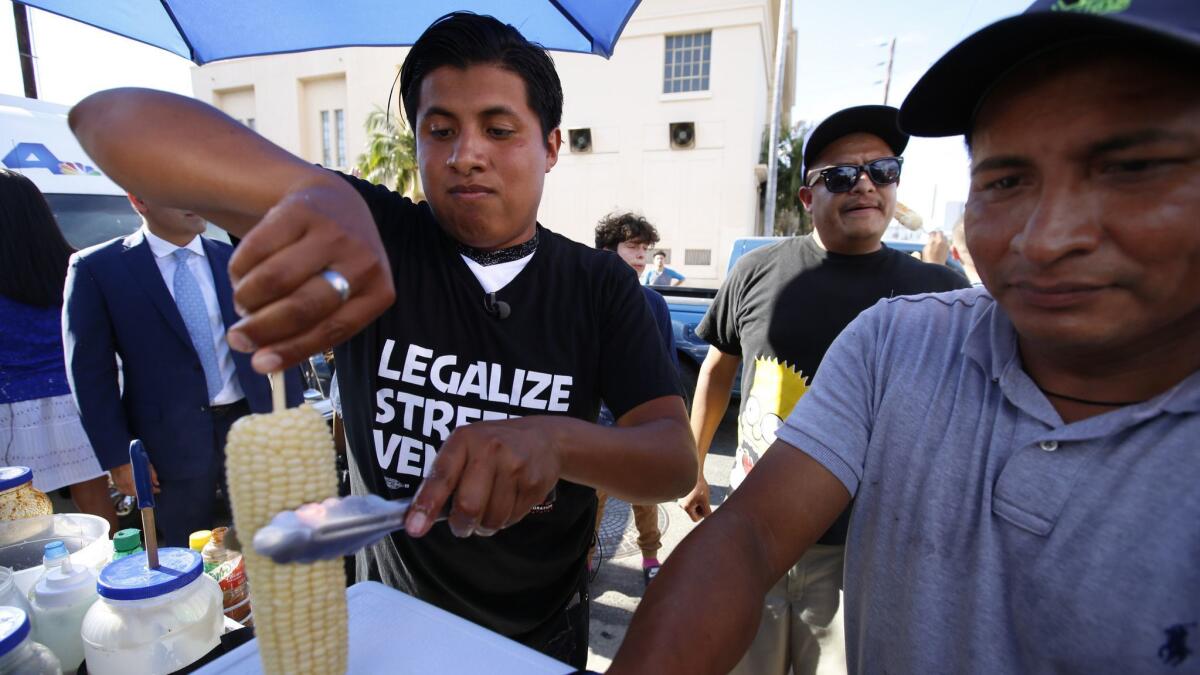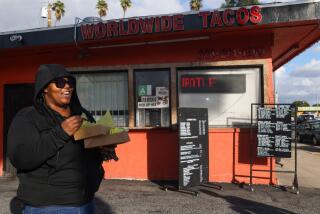Column: Power to the people who bring us street tacos and cheap T-shirts

Whenever someone tells me that street vendors are a civic nuisance — hawking unsanitary meals, neglecting to pay taxes and stealing customers from legitimate brick-and-mortar restaurants — I respond by sharing memories of the three times I suffered food poisoning in disgusting, vivid detail. If only those chefs went through a thorough vetting, I argue to the grossed-out listener, I would’ve been saved a lot of grief and Kaopectate.
As the person nods, I offer the grand reveal: It wasn’t fruit cart guys or tamale ladies who made me upchuck, but chefs at high-end restaurants with clean bills of health from the Orange County Health Care Agency. Not once have I contracted food poisoning from street food — not even from the chicken breast sashimi in green mole a Mexican lady sold me out of her apartment in Stanton.
So that’s why I rolled my eyes at the news that the Los Angeles City Council is finally working to legalize the sidewalk purveyors of tacos and T-shirts — years after street food became central to the city’s international culinary reputation. The council is just now deciding to do this?
The current proposal is nowhere near perfect. For instance, owners of nearby stores or restaurants can contest a vendor’s permit under the pretense that the vendor poses a health and safety risk. The bill also would place a limit of two vendors per side of a city block and keep them some distance from commercial venues like Staples Center, Dodger Stadium or the Hollywood Bowl.
But it’s a start. Cities across California should follow this lead — and then go even further. Let people sell what they want (as long as the product is legal, of course), where they want and for how much they want.
Government should be in the game of encouraging business, not trying to vanquish it.
Street vendors have plied their trade in California for more than a century for a reason: People love what they’re selling. From the tamale wagons that parked around what’s now L.A. City Hall in the 1890s to the Instagram favorites of Boyle Heights and beyond, they offer something that the public wants, whether a cheap meal or an experience. Politicians have passed law after law to stop them. They even created competing shopping districts; that’s how Olvera Street started. And yet the street sellers and their customers just move to a new block.
My entire life has been a movable feast of underground immigrant vendors. I buy wheels of stinky fromage from cheesemongers who smuggle them across the border. My family used to buy house-made chorizo from another family who would get pigs from a farm in the Inland Empire and slaughter them in their backyard. Distant relatives brought back suitcases of rare pumpkin seeds and buckets of quince paste from their villages to sell to the Mexican diaspora up here.
L.A. County officials estimate only one-fifth of street sellers offer grub. And indeed, I remember all sorts of unlicensed businesses supplying our family’s needs during my childhood. An aunt sewed wedding dresses from her garage; uncles did yardwork and cleaned pools. Luz, a family friend, prepped the hair and makeup of my cousins before quinceañeras; she even worked toward a degree until the state told her she was ineligible for a cosmetology license because she’d never graduated from high school.
Most wanted legitimacy, starting with a real storefront, but couldn’t afford one. That didn’t stop these hustlers from becoming financially independent and achieving their American dream off their unlicensed businesses. More importantly, I never once heard a complaint about any of them. They had a quality-control focus that made the USDA look as sloppy as a Cal Poly San Luis Obispo frat house. Wells Fargo and Chipotle can afford massive mess-ups; sole proprietors know that just one mistake can ruin their reputations with customers forever.
Why wouldn’t we want to encourage street vendors to operate in our neighborhoods? Government should be in the game of encouraging business, not trying to vanquish it. The more entrepreneurs we have, the more local economies grow, and the more political power minorities get.
This isn’t a taco-in-the-sky dream. Progressive activists have long pushed for working-class people to become their own bosses because they know small businesses’ revenues get reinvested within the communities they serve. “Once you and I go into business,” Malcolm X once preached, “what we will be doing is developing a situation wherein we will actually be able to create employment for the people in the community.”
That message still resonates today. A couple of weeks ago, I attended the annual conference in San Francisco of La Cocina, a great nonprofit that helps working-class women achieve their foodie goals with kitchen space, mentoring and help with finances and marketing.
“A community of natural entrepreneurs, given the right resources,” a statement on their website reads, “can create self-sufficient businesses that benefit themselves, their families, their community, and the whole city.” That mission statement sounds as pro-business than anything you’ll hear from the Chamber of Commerce or Establishment Republican.
Let a thousand eloteros and driveway mechanics bloom from Yreka to Calexico. And for the “legitimate” business owners who whine that such competition eats into their profits: Step up your game. This is capitalism, after all, not a socialist tea party.
Twitter: @gustavoArellano
More to Read
A cure for the common opinion
Get thought-provoking perspectives with our weekly newsletter.
You may occasionally receive promotional content from the Los Angeles Times.







